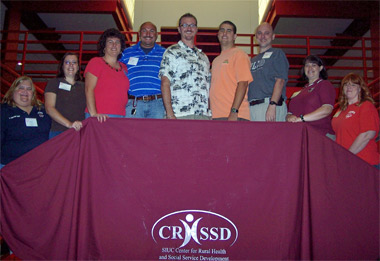
EMS instructor training -- The Rural Medical Transportation Network, a project of Southern Illinois University Carbondale’s Center for Rural Health and Social Service Development, recently hosted a National Association of Emergency Medical Service Educators’ Instructor Course. The Illinois Department of Transportation funds the network and nine area individuals attended courtesy of grant funding. Lead instructor scholarship recipients, left to right, are: Beverly Calvert, Kathryn Gibson, Wendi Bailey, Julian Lopez, Clay Lenzo, Zach Molnar, Shannon Clark, Jessica Terry and Penny Wilson. (Photo provided) Download Photo Here
July 16, 2010
EMS personnel take advantage of instructor course
CARBONDALE, Ill. -- Thanks to the Center for Rural Health and Social Service Development at Southern Illinois University Carbondale, a group of people from around the region got the needed training to help prepare them to become Emergency Medical Service instructors.
The center’s Rural Medical Transportation Network recently hosted the three-day Emergency Medical Service Educators’ Instructor Course, providing instruction, educational materials and practical application experience necessary for individuals to become EMS instructors. The Illinois Department of Transportation provided funding through the Rural Medical Transportation Network, a project in its fifth year.
The mission of the network is identifying and addressing gaps in the emergency and non-emergency rural medical transportation options in the southernmost 34 Illinois counties. One of the project’s discoveries is a need for affordable, local training opportunities for EMS personnel. Since Illinois regulations require that a trained lead instructor teach all EMS personnel in-service training, the network, with grant funding, offered this lead instructor training course and provided nine scholarships for emergency medical technicians and paramedics.
“By bringing this national training to our own back yard and providing needed scholarships to people in our region, we are building the essential infrastructure to positively impact the quality of local emergency medical services in our region,” said Kim Sanders, director of the Center for Rural Health and Social Service Development.
Sanders said increasing the number of trained lead instructors has a number of benefits including facilitating additional, high-quality in-house training for the region’s EMS personnel, assisting EMS personnel of the region in maintaining their EMT/paramedic licenses and enabling residents of the region to have enhanced emergency medical services.
Recipients of the Rural Medical Transportation Network scholarships to attend the course, listed by hometown with his or her ambulance service affiliation, are:
Bush
• Penny Wilson, Hurst Ambulance Service.
Carbondale
• Zach Molnar, Jackson County Ambulance Service.
Carterville
• Clay Lenzo, Jackson County Ambulance Service.
Du Quoin
• Shannon Clark, Lifestar/Washington County Ambulance.
• Jessica Terry, Jackson County Ambulance Service.
Hurst
• Beverly Calvert, Hurst Ambulance Service.
Olmsted
• Julian Lopez, Union County Ambulance Service.
Rosiclare
• Kathryn Gibson, Hardin County Ambulance Service.
Vienna
• Wendi Bailey, Johnson County Ambulance Service.
